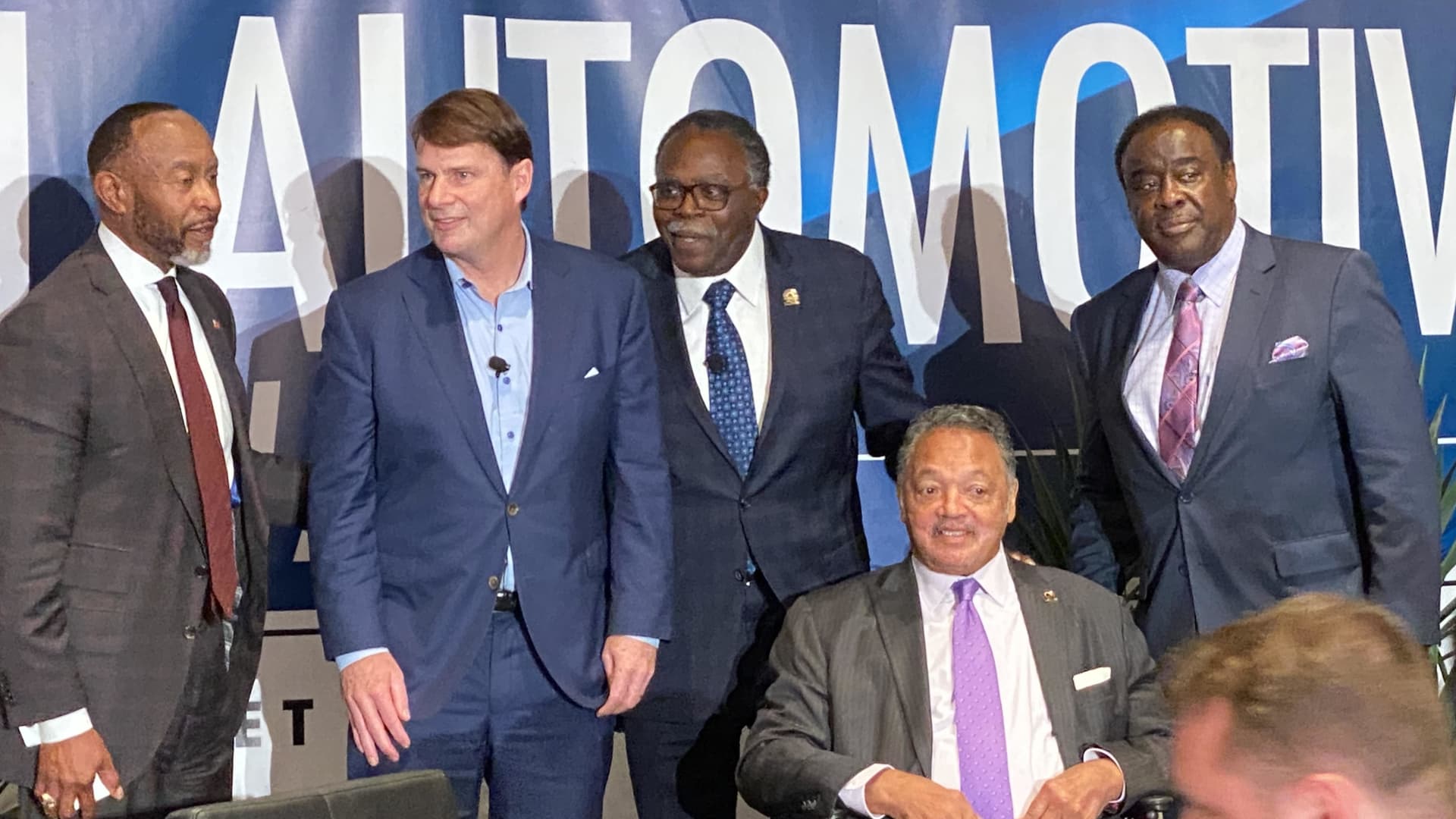DETROIT – Ford Motor is attempting to build as many of its own parts as possible for its electric vehicles to offset an expected 40% reduction in workers needed to build such cars and trucks, CEO Jim Farley said Tuesday.
Farley compared Ford’s latest efforts to source its own parts to the early days of the auto industry, when companies including Ford controlled most, if not all, of the components going into a vehicle.
“We’re going back to where we were at the beginning of the century. Why? Because that’s where the value creation is. It’s a huge transformation,” Farley told reporters after an auto conference for the Rainbow Push Coalition, a human and civil rights organization founded by Rev. Jesse L. Jackson.
In addition to making sense for the business, he said retaining the jobs and workforce is another reason Ford wants to build more parts in-house rather than purchasing them from suppliers.
He said Ford plans to build such businesses rather than acquire them. For its increasingly popular Mustang Mach-E crossover, the company purchased motors and batteries. Going forward, Farley said that will no longer be the case.
Ford is building twin lithium-ion battery plants in central Kentucky through a joint venture with South Korea-based SK Innovation, called BlueOvalSK, as well as a massive 3,600-acre campus in west Tennessee. The company announced the $11.4 billion investment late last year.
Such joint-venture battery plants have been a point of contention for the United Auto Workers union, as companies such as Ford and General Motors have said it will be up to workers of the plants to decide whether to unionize.
Farley reiterated those comments on Tuesday but also said Ford would be “thrilled” to have such representation.
The comments come as the United Auto Workers union is attempting to organize a joint-venture battery plant between GM and LG Energy Solution in Ohio.
Such joint-venture battery plants have been a point of contention for the United Auto Workers union, as the companies have said it will be up to workers of the plants to decide whether to unionize.
Wall Street has historically considered union representation a negative for companies, since it traditionally drives up labor costs and increases the potential for workforce disruptions such as strikes.
The UAW last month said it had filed a petition with the National Labor Relations Board on behalf of about 900 workers at the GM-LG joint venture, known as Ultium Cells, after the companies refused to recognize the union.

ivermectin 12mg stromectol – tegretol 400mg uk buy tegretol 400mg pills
accutane 10mg oral – decadron drug order linezolid without prescription
amoxil order – buy combivent 100 mcg pills ipratropium over the counter
order omnacortil pill – prometrium buy online prometrium 100mg sale
purchase augmentin pill – generic duloxetine cheap cymbalta
where can i buy doxycycline – doxycycline sale glipizide 10mg over the counter
buy tizanidine cheap – hydroxychloroquine order online hydrochlorothiazide 25mg generic
cialis next day – buy viagra online cheap viagra for sale online
generic viagra 50mg – real viagra cheap tadalafil generic
omeprazole for sale – purchase prilosec pills buy tenormin 100mg without prescription
clarinex cost – loratadine 10mg cost priligy over the counter
order misoprostol 200mcg online cheap – order generic misoprostol 200mcg diltiazem sale
order acyclovir sale – zovirax cost order rosuvastatin sale
buy domperidone – order domperidone 10mg online cyclobenzaprine 15mg usa
order domperidone without prescription – sumycin 500mg drug cyclobenzaprine uk
purchase inderal online – buy cheap propranolol methotrexate 5mg pill
order warfarin 5mg generic – warfarin 2mg over the counter buy losartan 50mg online
brand levaquin 500mg – buy cheap generic dutasteride buy zantac
buy esomeprazole 40mg – order sumatriptan 50mg sale imitrex 25mg uk
mobic 15mg pills – buy flomax tablets order tamsulosin generic